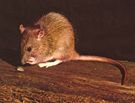Rat populations surge in Berkshire
A new breed of rats who seem almost immune to standard poisons are causing alarm in two Berkshire towns


Vermin in two Berkshire towns have developed near-immunity to standard poisons, resulting in a huge surge in the rodent population. The British Pest Control Association (BCPA), who identified the two unnamed towns in question are ‘very concerned, from a public health point of view,’ according to chief executive Oliver Madge. The association is calling on the Government to respond to the burgeoning rat population by allowing the use of more powerful pesticides.
Rat numbers in England are estimated to have swelled by 13% in the last year alone to over 50 million – meaning that there is now one for every person living in the country.
Furthermore, infestations in towns and cities in particular have reportedly doubled. In Salford there was a 40% rise in vermin call-outs in 2008, and a massive 66% increase in Exeter. Local newspapers in Reading have reported that there is a three-week backlog there, as the town’s rat-catchers are so rushed off their feet. The BCPA and the Department of Health are holding talks this week over what can be done.
Pest Control experts will appeal for the law to be changed, in order to allow brodifacoum and flocoumafen to be used outside as well as indoors. As it stands these powerful rodenticides can only be applied inside properties. Other EU countries do allow the use of these potent poisons outside, but there is concern about the possible dangers to pets and wild birds.
Mr Madge indicated that the popularity of recycling may be partly to blame for the infestation, citing that the conditions created are ideal for rats. ‘We are encouraged to recycle, but the rats tunnel under compost and they find it's both nice and warm and they have food.’ The mild winters and wet summers that England has seen in recent times create ideal conditions for rodents.
More than 35 diseases can be spread through rats and mice – these include a fever inducing nausea and muscle aches, passed via a bite or through contact with the rodent’s urine.
* Countrylife.co.uk’s top tips for getting rid of rats
Sign up for the Country Life Newsletter
Exquisite houses, the beauty of Nature, and how to get the most from your life, straight to your inbox.
Country Life is unlike any other magazine: the only glossy weekly on the newsstand and the only magazine that has been guest-edited by HRH The King not once, but twice. It is a celebration of modern rural life and all its diverse joys and pleasures — that was first published in Queen Victoria's Diamond Jubilee year. Our eclectic mixture of witty and informative content — from the most up-to-date property news and commentary and a coveted glimpse inside some of the UK's best houses and gardens, to gardening, the arts and interior design, written by experts in their field — still cannot be found in print or online, anywhere else.
-
 The century-old enamelling technique used to create Van Cleef's lucky ladybird brooch — which has something in common with Country Life
The century-old enamelling technique used to create Van Cleef's lucky ladybird brooch — which has something in common with Country LifeThe technique used in the jeweller's Geneva workshop has been put to good use in its latest creation.
By Hetty Lintell Published
-
 ‘The best sleep in the sky’: What it’s like to fly in United’s Polaris cabin, approved by American icon Martha Stewart
‘The best sleep in the sky’: What it’s like to fly in United’s Polaris cabin, approved by American icon Martha StewartUnited’s Business Class cabin goes by the name Polaris and Martha Stewart is a fan. So, how does it fare?
By Rosie Paterson Published
